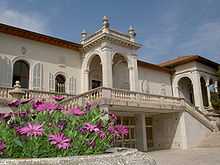International Institute of Humanitarian Law
| International Institute of Humanitarian Law | |
|---|---|
 | |
| Established | 1970 |
| President | Prof. Fausto Pocar |
| Location | Sanremo, Italy |
| Website | www.iihl.org/ |
The International Institute of Humanitarian Law is an independent, non-profit humanitarian organisation founded in 1970. Its headquarters are situated in Villa Ormond, Sanremo, Italy. A liaison office of the Institute is established in Geneva, Switzerland. The main purpose of the Institute is to promote the development of international humanitarian law, human rights, refugee law, immigration law and related issues.
Thanks to its specific, well-tested experience, the Institute has earned an international reputation as a centre of excellence in the field of training, research, and the dissemination of all aspects of international humanitarian law. Considering the aims it pursues, the Institute works in close collaboration with the most important international organisations, including the International Committee of the Red Cross (ICRC), the United Nations High Commissioner for Refugees (UNHCR), and the International Organization for Migration (IOM). It has operational relations with the EU, UNESCO, NATO, Organisation International de la Francophonie (OIF) and the International Federation of Red Cross and Red Crescent Societies. It has consultative status with the United Nations (ECOSOC) and the Council of Europe. It is also in close relations with top level research institutes like Institut du droit de la paix et du développement and The Hague Academy of International Law.
Organisation

The Institute is composed by more than 200 individual members from different nationalities. In accordance with the Statutes, they are persons that have particularly distinguished themselves through competence or activities in fields of specific interest to the Institute. Institutions significantly contributing to the work of the Institute may also be admitted as members. The General Assembly establishes and guides the general policy of the Institute.
The Council, which is elected by the General Assembly, oversees the management of the Institute, determining the programme of activities. It elects the President and Vice-Presidents, and appoints the Secretary-General and the Treasurer.
President of the Institute is Prof. Fausto Pocar, former President of the International Criminal Tribunal for the Former Yugoslavia, where he currently serves as Appeal Judge. Honorary President is Ambassador Maurizio Moreno, former Permanent Representative of Italy to NATO and President of the Institute from September 2007 to January 2012. Eminent personalities from diplomatic circles, scholars and experts are among the Institute’s Council members: Ms Christine BEERLI (Switzerland) Vice-President, International Committee of the Red Cross; Gen. Erwin Dahinden (Switzerland), Chief of the International Relations Section of the Swiss Armed Forces; Dr. Baldwind De Vidts, Legal Adviser to the NATO Secretary General; Dr. Ndioro Ndiaye (Senegal), Deputy Director General of International Organization for Migration; Prof. Yoram Dinstein (Israel), Emeritus Professor at University of Tel Aviv; Prof. Jacques Forster (Switzerland), Emeritus Professor at the Geneva Institute for Advanced Studies in Development; Prof. Dr. Wolff Heintschel von Heinegg (Germany), Head of the Faculty of Law at Viadrina University, Frankfort; Prof. Marie G. Jacobsson (Sweden), Principal Legal Advisor at the Swedish Ministry of Foreign Affairs; Dr. Michael A. Meyer (United Kingdom), Head of the International Humanitarian Law Office of the British Red Cross; Judge Hisashi Owada (Japan), President, International Court of Justice; Prof. Fausto Pocar (Italy), former President of the International Tribunal for the former Yugoslavia; Prof. William H.Taft IV (USA), Former US Permanent Representative to NATO, Professor of International Law at Stanford Law School; Prof. Michel Veuthey, Associate Professor University of Nice.
The Municipality of Sanremo and the Italian Red Cross are ex officio members of the Council of the Institute.
Activities
The main activities of the Institute span the following sectors:
Training of civil and military personnel
Every year, the Institute organises basic courses, training courses, and advanced courses in the field of international humanitarian law, human rights, refugee law and immigration law for military personnel, government officials, diplomats, experts, representatives of non governmental organisations, and students from all over the world. These courses, which are organised in collaboration with interested international institutions and countries, are taught in various languages (French, English, Spanish, Arabic, Chinese and Russian) by qualified teachers of different nationalities, using a multidisciplinary interactive approach.
Organisation of conferences, workshops and round tables
These events are much appreciated by the international community as they offer an opportunity for periodic dialogue and debate on topics of international humanitarian law, human rights and other related issues. They encourage members of scientific, diplomatic, institutional and military circles from all over the world to meet informally to examine the more burning issues concerning the promotion of, respect for and development of international humanitarian law with an eye to the future. Almost forty years of meetings and intense academic activity addressing the main topics of humanitarian law, under the auspices of the Institute, have created what has universally become known as “humanitarian dialogue in the spirit of Sanremo”.
Research and publications
The Institute has become increasingly involved in research activities, study and analysis. It publishes texts, essays and monographs that aim to contribute to the awareness of issues relevant to international humanitarian law and its different aspects. The “San Remo Manual on International Law Applicable to Armed Conflicts at Sea”, which was compiled between 1988 and 1994, still remains the most consulted Manual in Naval Military Academies all over the world, and is considered to be a reference work of world repute. “The Manual on the Law of Non-International Armed Conflict”, which was published in March 2006, is the Institute’s latest Manual. It reflects the developments registered by humanitarian rules at a time where conflicts all too often differ from classical warfare waged between States that are bound by The Hague Conventions and the Geneva Protocols. For over ten years now the Institute has continued to produce a series of publications dedicated to the proceedings of its main Round Tables. In addition, it distributes a “Newsletter” every two months.